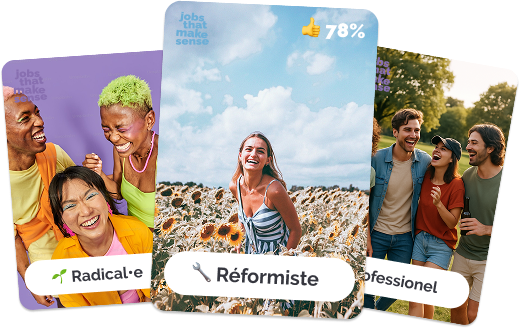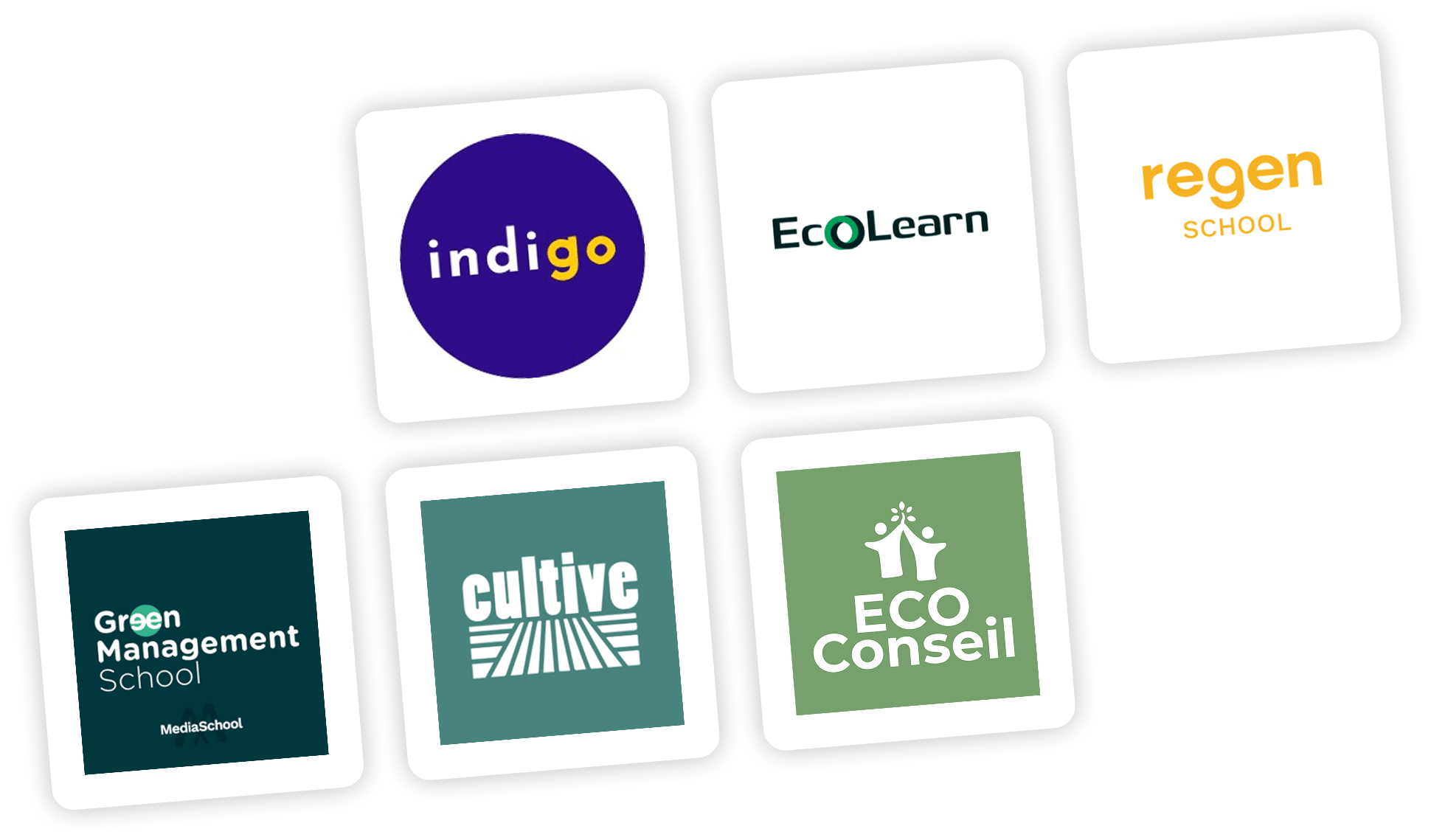Lucas Mirgalet - ingé d'avenir "It's possible to combine meaning and salary."
"At school, I was told to do engineering, so I did engineering."
Lucas left his home town of Marseille to enter the Ecole des Ponts et Chaussées in Marne La Vallée in 2005. It's the best school he gets in the ranking of engineering schools. He chose the civil engineering and construction curriculum. At the time, there was no talk of global warming or carbon footprints. They were talking finance, consulting and international careers;
Carbon footprint was not an issue
After school, Lucas worked in a railway design office, with a strong international aspect. "I have a horrible carbon footprint at the time, but it's really not an issue." He worked there for 7 years, then returned to France with his partner."I went back to school, taking an MBA with the idea of continuing to work in multicultural environments." Following this resumption of studies, several options were open to him: join big consulting firms and "have no life", a digital startup (like Uber, Amazon), or... an impact structure. At his MBA school, he is seeing the emergence of impact organizations such as Change Now, led by colleagues from his graduating class. Having two children of his own, Lucas chose to stay on the same path for the time being: with major groups. He first joined Vinci in the United States, then moved on to a position at Bureau Veritas: "it was a corporate job, at La Défense, in a suit. I saw slides all day long, flew to Shanghai, Houston..." Finally, after 2 years, he found that he was bored and didn't see his children much.
The question of meaning at work
"When you're wearing a suit in defense, you ask yourself: what's the point?" You've got colleagues who are 50, 55 years old, who work with oil companies and who say to you: "I'm pissed off, but I earn a fortune. I've got 300,000 euros in stock. Why change jobs?" For Lucas, this prospect doesn't make him dream: "Do I want to do this and have the golden handcuffs?" he asks himself. No, that's definitely not how Lucas sees his future tomorrow. "You get up in the morning, you want to tell yourself you've spent your energy properly at the end of the day." The covid and the ecological issues that jostle him confirm his feelings. During confinement, he listens to Jean-Marc Jancovici, watches Thinkerview videos and reads IPCC reports. "You understand that when you fly, it emits so much C02, when you eat meat too..." Touched by the subject, he then finds out what he can do and starts animating climate frescoes.
"Becoming independent. Maybe that's what freedom is all about."
Become an independent consultant
Lucas then decided to support companies in digital marketing, taking an interest in these subjects alongside his previous job. He rubs shoulders with start-ups, fumbles his way around, looking for his place. He says to himself that "becoming independent could be what freedom is all about" This adventure will last 2 years. Being self-employed isn't easy, he loses customers and the covid in 2020 weakens his business. Added to this are questions about the meaning of his work: "I say to myself that I want to be in a company to move things forward, rather than being independent." For a change, he starts again from what he knows: "as a consultant, I mainly worked with companies in the construction industry, and I had discovered energy renovation." The sector is on the move, and it's a pillar of the energy transition. Ideas are maturing. It takes time. Lucas began by investigating the players in the energy renovation sector and asked to meet them. This he does with ease. "When you ask people on LinkedIn to talk about their business, they're often happy to do so." He then follows a few moocs to train himself and dares to knock on the doors of numerous companies to share his interest in the sector. His approach proved successful, as he landed a job with the éco-isolateurs in 2021, directing insulation work.
"I've found a job in a company that values my skills, without much loss of salary."
It's possible to combine meaning and salary
Lucas worked at eco-isolators for 1.5 years, leaving when it was bought by EDF. He then joined Thermi Conseil, an energy renovation consultancy, where he has worked since November 2022. "We do thermal studies there before renovation work, and I'm business development manager. That's what I like. I take care of the communication, marketing, partnership development and engineering part to understand the market and its evolutions." His work has meaning, he has responsibilities, that's what he's looking for, what interests him. And what's more, he adds, "I earn a very good living." At the time of this professional reconversion, Lucas is the father of 2 children and is 39 years old. And he'd like to share this message: "it's possible, there aren't only reconversions at 25 or 30."
"Today, there are training courses that make it easier to switch to energy renovation."
Recruitment needs
"I see it in the company where I work: if someone is retraining, doesn't have all the technical background but is motivated and wants to get involved, we'll hire them." Energy renovation is, moreover, a sector of the future. A friend of Lucas worked on the Shift Project's "Employment" report. This report indicates that in the building sector, there will be less new construction and a shift to building renovation. "That's what's happening right now, with boxes in new construction going bust", he points out. He gives the example of Geoxia, known for its Phénix homes, which has filed for bankruptcy, and "players increasingly present in renovation". He, himself, tried to join the sector by self-training and highlighting his acquired skills, but today, it's even easier, as there are training courses that facilitate reconversions to this type of profession. In particular, he cites la Solive. "Lately, we've hired someone over 50, who did the La Solive training", says Lucas.
"The alignment is there because there's the ecological and social dimension, from the values of the president of the box and the governance of the company."
SMEs are nice too
Four years ago, Lucas was making a good living, but trading with people on the other side of the planet. "What's the point?" he asks himself today."Now my friend is the SNCF. It's great to work in France." For him, the Pme is also the right size. In the structure he joined,"there's a human dimension, no politics and an alignment of everyone towards the desire to do well." He adds that the alignment is present, "because the ecological and social dimension, is part of the values of the president of the box." In the company, there's a lot of communication, which differs with his previous experiences. For him, "this dimension is fundamental today." Lucas also sees the concrete effects of his work, and finds it nicer to tell his children:"daddy renovates houses"rather than"daddy does marketing."
"I don't like the notion of sacrifice."
"I'm going to build a startup for 3 years and it doesn't matter if I don't pay myself" that's the kind of thing you might say to yourself, when embarking on impact entrepreneurship or entrepreneurship at all. But Lucas, at no point did he consider taking these risks: "I don't like the notion of sacrifice" he says. Working in a place with great values and continuing to earn a good living, without being stressed by this money issue, is possible for him. As he puts it "If you're an executive and you're bored, you can do it! ;)"
Further information
👉 Energy-efficient building renovation: an industry that's hiring
👉 Decarbonizing buildings: "there are 300,000 people to be trained by 2030 in energy renovation"
Taking action
👉 La solive training for a retraining in energy renovation
👉 Come On training to boost skills in energy renovation



